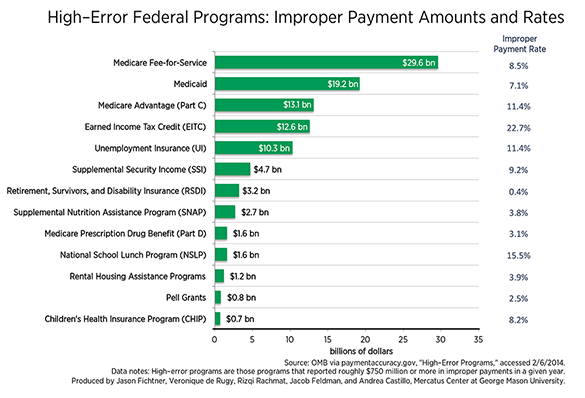Erroneous Subsidies for Obamacare Coverage Nothing New for Feds, Who Make $100 Billion in Mistakes Per Year
Yesterday Peter Suderman reported that about 1 million people who have signed up for Obamacare have gotten inaccurate subsidies for their coverage:
The law's subsidies are doled out based annual income, and people who apply for coverage are responsible for submitting income data in order to prove eligibility for the subsidies. The problem is that a million or so people have entered incomes that differ substantially from what the Internal Revenue Service (IRS) has on file.
Normally this would be reconciled through a follow-up auditing process; when the system identifies people whose submitted incomes don't match IRS records, those people are asked to send in further paperwork as proof. But only "a fraction" of those people have responded, according to [The Washington] Post. And even when they have provided additional documentation, it doesn't matter.
It doesn't matter because the government isn't following up on the mismatches. It will be interesting to see how many people mistakenly claim they don't smoke, either (smoking is the one activity—it's not a pre-existing condition precisely—that will increase your premiums).
But as Reason columnist and Mercatus Center economist Veronique de Rugy and her Mercatus colleague Jason J. Fichtner have pointed out, erroneous payments by the federal government are nothing new. Programs such as the Earned Income Tax Rate (EITC), the school lunch program, Medicare Advantage, and unemployment insurance all have improper payment rates in the double digits.
Based on data from the Office of Management and Budget (OMB), de Rugy and Fichtner note that "over $100 billion in taxpayer funds were improperly spent in 2012," the latest year for which numbers are fully available. Some programs (such as Social Security) have low error rates but nonetheless fork over huge amounts in mistaken payments. Social Security's Retirement, Survivors, and Disability Insurance (RSDI), explain the Mercatus analysts, has an error rate of just 0.4 percent but still sent out $3.2 billion in improper payments.
Other programs
not only have a high improper payment amount but also a relatively high improper payment rate. The $12.6 billion in misspent EITC outlays represents a substantial portion, 22.7 percent, of total EITC spending—suggesting that the EITC is prone to fraud, waste, and abuse. As the chart displays, Medicare Advantage (Part C), Unemployment Insurance (UI), and Supplemental Security Income (SSI) face problems similar to the EITC, with anywhere approximately from one in nine to one in eleven dollars in these programs being disbursed improperly.
Read more here. Below is a chart showing error rates. We can look forward to future charts that will include Obamacare subsidies, for which most people on the individual insurance market qualify.

Editor's Note: As of February 29, 2024, commenting privileges on reason.com posts are limited to Reason Plus subscribers. Past commenters are grandfathered in for a temporary period. Subscribe here to preserve your ability to comment. Your Reason Plus subscription also gives you an ad-free version of reason.com, along with full access to the digital edition and archives of Reason magazine. We request that comments be civil and on-topic. We do not moderate or assume any responsibility for comments, which are owned by the readers who post them. Comments do not represent the views of reason.com or Reason Foundation. We reserve the right to delete any comment and ban commenters for any reason at any time. Comments may only be edited within 5 minutes of posting. Report abuses.
Please to post comments


Excellent stock photo choice.
Lesko is legend. I'm rolling in laughter. That suit. That freaking suit!!!!!!!!
And when the penalty phase kicks in, how many do you think will check the "I have health insurance" block on their tax return when actually they don't? There aren't enough auditors in the world to catch all the fraud that is/will be perpetuated through Medicare/Medicaid/Obamacare.
And, on the other hand, how much is genuine fraud, and how much is the government's inability to design a process that is simple enough that two clerks in the department that is supposed to oversee the process can get the same results from the same data?
Pretty sure the government, in most areas, would not do well on a rigorous measurement-system analysis, or score well on either reproduceability or repeatability. Arbitrary/incompetent is as arbitrary/incompetent does.
However, I don't feel much ire about "fraud" related to keeping your money instead of handing it to the government. I'm more concerned about the fact people are being forced to lie to keep what's theirs , versus pearl-clutching over "fraud". I wouldn't even use that term, though it would be technically correct.
Three felonies a day and all.
Some see this misspending as a problem, others see it as a solution. When the government gives you my money it's a crime, when it gives me your money it's my due and right as an American citizen.
Why the ACA subsidy discrepancy should surprise anyone is beyond me.
Obamacare "navigators" were caught on camera encouraging people to lie when they signed up.
http://townhall.com/tipsheet/c.....s-n1744784
Yes, I highly doubt most people are being truthful about the cigarette usage. Is there any method for insurance companies to verify this? If not then the price of policies for the non-smokers is going to rise to just below that of smokers.
If you get sick they can tell by the nicotine in your cells.
I wonder if they will use that to deny coverage after the fact.
I suppose this administration ( who brags about rewarding their friends and punishing their enemies ) might check the voter registration records on a case by case basis to determine.
Seriously, those that defend government at all costs have nothing to say about this.
They'll argue very gray terms like "fair pay" and "inequality" but when there is proof right in front of their face that government isn't all it's cracked up to be, they have nothing to say.
That simply makes you a hack.